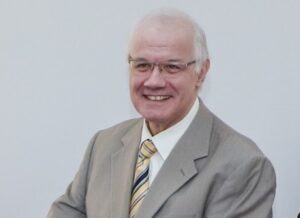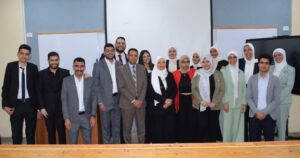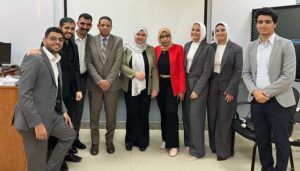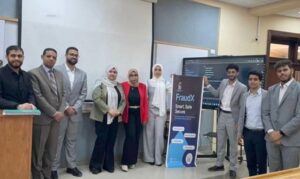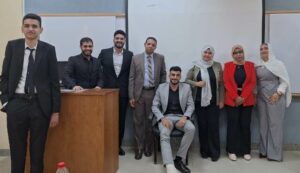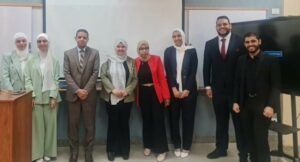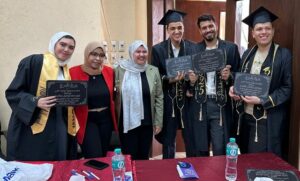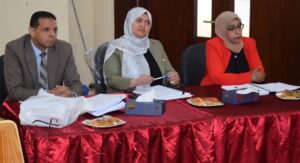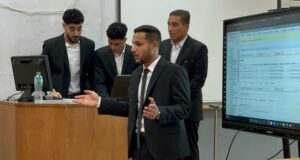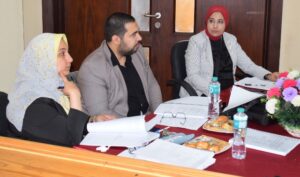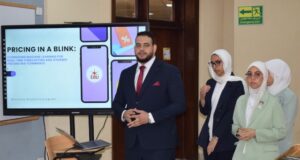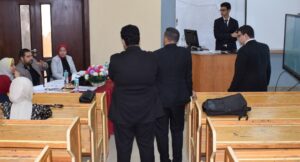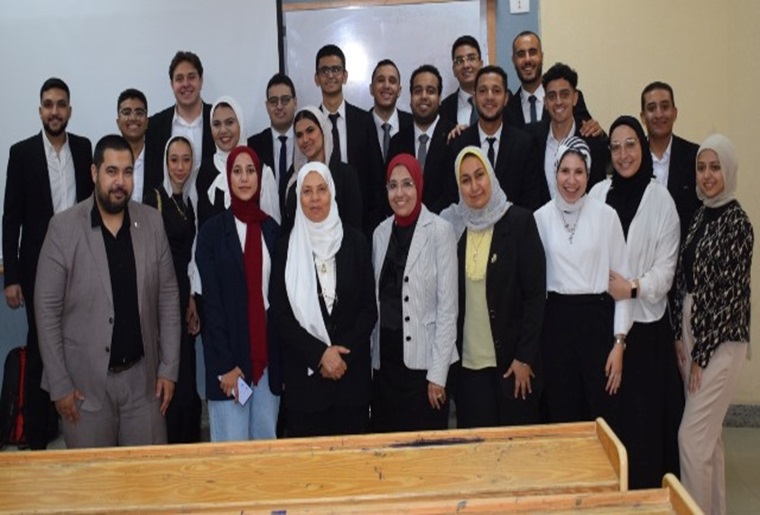Faculty of Management at Egyptian Russian University Prepares Graduates for Future Jobs … photos
Dr. Sherif Fakhry Mohamed Abd-el-Naby, President of the Egyptian Russian University (ERU), announced that the university’s Faculty of Management, Economics and Business Technology organized a distinguished scientific celebration on the occasion of discussing the graduation projects, which coincided this year with two notable events: the graduation of the first batch of the “Business Analytics” program, and the graduation of the second batch of the “Management Information Systems” (MIS) program. He stated that the graduation projects submitted by students from these programs were discussed during the celebration, with the support of Dr. Mohamed Kamal Mustafa, Chairman of the University’s Board of Trustees.
In the same context, Dr. Al-Tahera Al-Sayed Hameyah, Dean of the Faculty of Management, Economics and Business Technology at the ERU, asserted that, based on the commitment of the faculty management to directing students’ efforts toward serving national development issues, this year’s graduation projects were inspired by the goals and themes of “Egypt Vision 2030,” representing the students’ commitment to their role in supporting the digital transformation process and achieving sustainable development. She pinpointed that all of the faculty’s programs support future jobs with modern technologies, and especially jobs in the areas of data science, artificial intelligence, and business technology.
The Dean of the Faculty of Management, Economics and Business Technology at the ERU explained that the committee that discussed the graduation projects of the Business Analytics Program (first batch) consisted of: Dr. Rowida Aly, Lecturer of Statistics at the Faculty’s Business Technology Department, Dr. Asmaa Fawzy, Lecturer of Artificial Intelligence at the Faculty of Computer Science and Information at Misr University for Informatics, and Dr. Yasser Salah-el-Deen, Professor of Artificial Intelligence at the Faculty of Computers and Information at Sadat Academy for Management Sciences. The first project was titled “Pricing in a Blink: Leveraging Machine Learning for Real-Time Forecasting and Dynamic Pricing in E-Commerce.”
The project offers a smart system for automatic pricing and distribution upgrading in “B2B” e-commerce companies in Egypt. The team used actual data and advanced forecasting models such as CatBoost and XGBoost.
Dr. Al-Tahera Al-Sayed Hameyah added that the previous models were combined with a linear programming model in order to determine optimal quantities. “MILP” was applied to automatically update prices, resulting in a 6.04% decrease in weekly costs and a 3.4% increase in profits in one week. The platform used was Mage.ai for automatic retraining and performance monitoring. The project was presented by the following students: Sandro Sameh Boshra, Tuqa Al-Sayed Abd-el-Sattar, Gannah-Allah Saleh Abu-el-Ata, and Rawda Emad Ahmed, and it was supervised by: Dr. Rowida Aly and Assistant Lecturer/ Amer Ibrahim.
The Dean of the Faculty of Management, Economics and Business Technology at the ERU also stated that the second project titled “From Code to Coin: Data Science in Cryptocurrency Analysis,” aimed at helping investors make decisions based on accurate data by forecasting the revenues of “Coinbase 50” Index for the next day. The team depended on global economic variables such as oil and gold prices, in addition to the S&P 500 and Nasdaq indexes, with the application of XGBoost and LightGBM models to achieve the best accuracy. She highlighted that the project was carried out by the students: Mariam Abd-el-Hamid Mahmoud, Nouran Amr Mohamed, Barbara Romany Lotfy and Reem Ibrahim Mahmoud, and it was supervised by Dr. Rowida Aly and Assistant Lecturer/ Amer Ibrahim.
Dr. Al-Tahera Al-Sayed Hameyah said that the third project was titled “Driver Drowsiness Detection Using Machine Learning: Enhancing Driver Safety.” It is about a smart system for detecting driver’s drowsiness using computerized vision and deep learning. The team developed a system that monitors the driver in real time using only a camera to detect indicators of fatigue such as closing the eyes, head position, and yawning. The project used “CNN” and eye aspect ratio (EAR) technologies to alert the driver immediately without the need for wearable devices. The project, thus, contributes to enhancing road safety. The project was implemented by the students Zahraa Abd-el-Halim Jaber, Mina Thabet Naeem, Mohamed Wael Mahmoud, and Farida Abdullah Abd-el-Hamid, under the supervision of Dr. Rowida Aly and Assistant Lecturer/ Amer Ibrahim.
The Dean of the Faculty of Management, Economics and Business Technology at the ERU also stated that the fourth project was titled “Fake News Detection for Sports Using AI Techniques.” The project focuses on verifying the authenticity of sports news, especially those related to player transfers, by analyzing news from multiple sources. The team used modern techniques such as “BERT” model and “Gemini LLM” model to analyze texts and provide results supported by logical explanation and external sources, which enhances the credibility of information. The project was carried out by the students Mohamed Atef Mahmoud, Basant Ahmed Saad, Aly Mohamed Gamal, and Al-Sayed Mohamed Mahabah, and was supervised by Dr. Rowida Aly and Assistant Lecturer/ Amer Ibrahim.
Dr. Al-Tahera Al-Sayed Hameyah added that the fifth project titled “A Recommendation System Leveraging Artificial Intelligence to Mitigate Healthcare Risk” addressed a common problem in medical platforms: the difficulty of choosing the appropriate medical specialty based on a description of symptoms. The system uses natural Arabic language to analyze the user’s description and direct them to the correct specialty using RAG, Naïve Bayes, and Random Forest techniques. The system provides an easy-to-use interface via Streamlit to support safe initial decision-making for patients. The project was implemented by the students Abd-el-Rahman Mohamed Sayed, Mariam Mohamed Ibrahim, Wessam Mohamed Abd-el-Sabour, Amr Ayman Abd-el-Aziz and Abdullah Mohamed Khallaf, under the supervision of Dr. Asmaa Fawzy and Assistant Lecturer/ Shady Abd-el-Moneim.
The Dean of the Faculty of Management, Economics and Business Technology at the ERU stated also that the sixth project was titled “Optimizing Financial Security Risk Management Using Artificial Intelligence Techniques.” The project aims at improving the accuracy of credit card fraud detection, especially in exceptional cases. The team depended on CTGAN technology to generate artificial data for the purpose of data balancing, in addition to combining LSTM and Autoencoders algorithms, in addition to analyzing text data using LLMs and RAG models. The project accomplished a significant improvement in the accuracy and efficiency of classification. The project was implemented by the students Abd-el-Rahman Mahmoud Ahmed, Gannat-Allah Asaad Abdullah, Aly Muhammad Aly Fahim, and Ahmed Khaled Abd-el-Fattah, under the supervision of Dr. Asmaa Fawzy and Assistant Lecturer/ Shady Abd-el-Moneim.
In another context, Dr. Al-Tahera Al-Sayed Hameyah added that the graduation projects of the Management Information Systems program were discussed by a committee consisting of: Assistant Professor/ Mohamed Abd-el-Salam, Dr. Ghada Nabil, Dr. Asmaa Fawzy, and Dr. Reham Abdullah.” The first project was titled: “Health Care Information System (HCIS),” under the supervision of Dr. Ghada Nabil Hashim, First Assistant Supervisor/ Dr. Reham Abdullah Abd-el-Moneim, Second Assistant Supervisor, and Mr. Abd-el-Fattah Ayman. The students Ahmed Mohamed Helmy, Adham Alaa Omar, Radwa Sherine Mohamed, Lemy Ramy Mohamed, and Alaa Nabil Hussein, created an information system that enhances immediate communication between doctors, pharmacists, and analysis laboratories, which reduces delays and errors in providing health care for patients. Key features include electronic prescriptions and laboratory test management and giving patients access to their medical records. The system was specifically designed for small hospitals, offering an easy-to-use interface, low cost, and scalability. HCIS improves work efficiency, increases patient engagement, and coordinates healthcare, conforming with Egypt’s Vision 2030 for digital transformation in the healthcare sector. The system was built by using HTML, CSS, JavaScript, PHP, and MySQL technologies.
The Dean of the Faculty of Management, Economics and Business Technology at the ERU stated that the second project was titled “E-Parking System for Egypt International Exhibition Center,” which is the electronic parking system at the Egypt International Exhibition Center. The project was supervised by Dr. Ghada Nabil Hashim, First Assistant Supervisor/ Dr. Reham Abdullah Abd-el-Moneim, Second Assistant Supervisor, and Ms. Safaa Adlan. The students Paula Samy Philip, Ola Ayman Mohamed, Mohannad Amgad Moussa and Youssef Ashraf George created a mobile application and website for pre-booking parking spaces at Egypt International Exhibition Center to be used during major events. The project, thus, ensures smooth and hassle-free access, contributing to a more organized, easier, and environmentally friendly urban experience.
Dr. Al-Tahera Al-Sayed Hameyah indicated that the third project was titled “Mobile Application for Electronics Store with Accessibility Support for the Disabled.” It is a mobile application for electronics store with accessibility support for people with special needs. The project was supervised by Dr. Ghada Nabil Hashim, First Assistant Supervisor, Dr. Reham Abdullah Abd-el-Moneim, Second Assistant Supervisor and Ms. Mona Gomaa. The project was submitted by the students Yassa Morris Tawfik, David Gamil Fakhry, Mustafa Hassan Abd-el-Halim and Khaled Ashraf Mohamed. They developed a mobile application for electronics store that supports accessibility, and is designed to provide an inclusive shopping experience for users with visual disabilities, color blindness, as well as people without disabilities. To overcome access barriers, the application integrates an AI-powered voice assistant, in line with Egypt’s Vision 2030. The project contributes to promoting digital inclusion and economic empowerment, enabling people with disabilities to shop independently and enhancing digital shopping.
The Dean of the Faculty of Management, Economics and Business Technology at the ERU pinpointed that the fourth project was titled “Club Management and Services Website,” an electronic website for managing club services. The project was supervised by Dr. Asmaa Fawzy, First Assistant Supervisor, Dr. Reham Abdullah Abd-el-Moneim, Second Assistant Supervisor, and Ms. Nada El Shafei. The students Ahmed Hesham Ayyad, Mahmoud Mohamed Farag, Mohamed Mahmoud Abd-el-Latif and Mohamed Nasser Mohamed, developed a website which aimed at simplifying the operational processes within clubs, providing an integrated digital platform that allows members and visitors to interact with club services through features such as applying for and renewing memberships, booking activities and facilities, ordering food online, and an online store to purchase the club products. Administrators also have a dashboard to manage bookings and approvals.
Dr. Al-Tahera Al-Sayed Hameyah also stated that the fifth project was titled “Website for Enhancing Learning and Collaboration at Egyptian Russian University,” which is an electronic website to enhance learning and collaboration at the Egyptian Russian University. The project was supervised by Dr. Ghada Nabil Hashim, First Assistant Supervisor, Dr. Reham Abdullah Abd-el-Moneim, Second Assistant Supervisor, and Ms. Mannat-Allah Khaled Ahmed. In this project, the students Karim Khaled Atta, Ibrahim Naguib Aziz, Eyad Hamed Nabawy, Hady Al-Sayed Qabil, Moatasem Khaled Abd-el-Azim and Mohamed Moataz Mohamed have created an online platform to enhance collaboration between students and faculty members at the Egyptian Russian University. The main features of the platform include the ability to upload and download books and documents, participate in university events, and share skills between students and faculty members. The platform also includes dashboards for administrators to help them monitor performance and manage resources easily.
The Juries paid tribute to the students’ skills and the extinguished quality of the projects that conform to the market demands in light of the digital revolution which we are experiencing.
